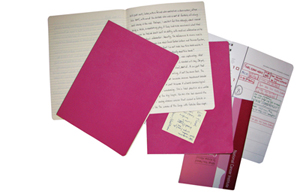Poets & Writers Magazine welcomes letters from its readers. Please post a comment on select articles at www.pw.org/magazine, e-mail editor@pw.org, or write to Editor, Poets & Writers Magazine, 90 Broad Street, Suite 2100, New York, NY 10004. Letters accepted for publication may be edited for clarity and length.
 The Keeper of Pages
The Keeper of Pages
Poets & Writers Magazine was called Coda then, in the 1970s, when I was sitting in the living room of Anaïs Nin’s home in Silver Lake, California. Along with a few other wide-eyed writing students, I was there to learn everything I could about journals and diaries, and especially about how Nin used the journal to fuse the many facets of her life, her dreams, her imagination. She noticed that I was leafing through a copy of Coda, which I had never seen before. “Here,” she said, in her soft-flowing French accent, as she went into her office to bring out a stack of them for us. “Here. Take them home. Study them. They will show you how writers and poets communicate.”
That was thirty-nine years ago, and today I found myself going back in time as I read with interest “The Private Dwelling: Three Poets on Keeping (and Destroying) a Journal” by Lisa Fay Coutley, Claudia Emerson, and Anna Leahy, in the September/October 2014 issue. Thanks for spotlighting this process, especially important for writers and poets today, in this fast-paced time in history. There is no one way to keep a diary, but however it’s kept, the keeper of these pages has the blessed opportunity to question and to discover. When our sessions were ending (Nin was already quite ill at that time), I was left with a burning question, which I shared with her: “Do I create the journal, or does the journal create me?”
Leah Schweitzer
Valencia, California
A Question of Respect
I just read Steve Almond’s “The Problem of Entitlement: A Question of Respect” (September/October 2014), and wanted to say how true and inspiring it was. I’ve been involved with various writers workshops both in person and online for some twenty years and as he says, so much has changed in that time. It is important to look at the positive examples, to seek out the good in stories, writers, and publications rather than complaining about sour grapes and denigrating others. There is only one way to become a better writer—by putting in the time and learning everything you can from those around you.
Kenny A. Chaffin
Denver, Colorado
Almond is quite correct when he writes, “A good workshop should offer honest feedback—painfully honest if necessary…. But such criticism should be preceded by a discussion of what the writer was trying to achieve, and where the writer was most successful.” I would add that the workshop has a third and even more important purpose: to provide writers with concrete suggestions for achieving their aims. Every person in the room should be required to contribute constructive ideas. The unwillingness of many students—and even a few professors—to help the people in the room can cause an unwarranted disillusionment with the study of creative writing.
Robert Clark Young
San Diego, California
We hear a lot of scary stories these days about the proliferation of MFA programs and how this phenomenon is shaping our literature. I don’t buy most of it. But one thing that has changed is that prospective MFA students have a lot of choices about where they go to get their degree. So I don’t think it’s too out of line for them to expect that the MFA programs they choose will provide them with good teachers. Graduate students want to read, to discover things about literature, and they want more than anything to be taught. They want teachers to be candid with them, and they want to be taken seriously. If Almond’s students are uninspired, maybe he should think about how well he’s doing his job.
Samuel Amadon
Columbia, South Carolina







